Search Thermo Fisher Scientific
Invitrogen
Phospho-GYS1 (Ser641) Recombinant Rabbit Monoclonal Antibody (SR46-06)
FIGURE: 1 / 6
Phospho-GYS1 (Ser641) Antibody (MA5-31983) in ICC/IF
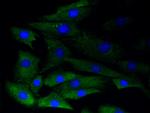
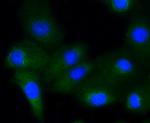
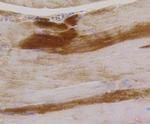
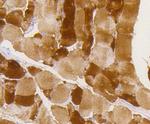
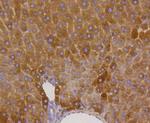
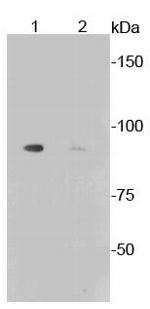
Product Details
MA5-31983
Species Reactivity
Host/Isotype
Expression System
Class
Type
Clone
Immunogen
Conjugate
Form
Concentration
Purification
Storage buffer
Contains
Storage conditions
Shipping conditions
RRID
Product Specific Information
Recombinant rabbit monoclonal antibodies are produced using in vitro expression systems. The expression systems are developed by cloning in the specific antibody DNA sequences from immunoreactive rabbits. Then, individual clones are screened to select the best candidates for production. The advantages of using recombinant rabbit monoclonal antibodies include: better specificity and sensitivity, lot-to-lot consistency, animal origin-free formulations, and broader immunoreactivity to diverse targets due to larger rabbit immune repertoire.
Target Information
Glycogen Synthase 1 (GYS1) catalyzes the addition of glucose monomers to the growing glycogen molecule through the formation of alpha-1,4-glycoside linkages. Mutations in this gene are associated with muscle glycogen storage disease. Alternatively spliced transcript variants encoding different isoforms have been found for this gene.
For Research Use Only. Not for use in diagnostic procedures. Not for resale without express authorization.
References (0)
Bioinformatics
Protein Aliases: EC 2.4.1.11; Glycogen [starch] synthase, muscle; glycogen synthase; Glycogen synthase 1; glycogen synthase 1 (muscle); glycogen synthase 3, brain
Gene Aliases: GSY; GYS; GYS1; Gys3; MGS
UniProt ID: (Human) P13807, (Mouse) Q9Z1E4
Entrez Gene ID: (Human) 2997, (Mouse) 14936

Performance Guarantee
If an Invitrogen™ antibody doesn't perform as described on our website or datasheet,we'll replace the product at no cost to you, or provide you with a credit for a future purchase.*
Learn more
We're here to help
Get expert recommendations for common problems or connect directly with an on staff expert for technical assistance related to applications, equipment and general product use.
Contact tech support
